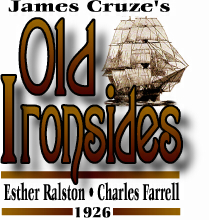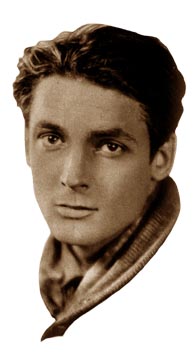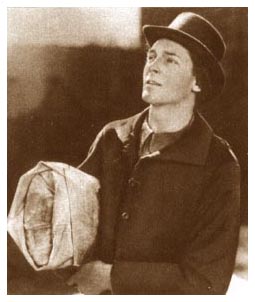

Charles Farrell is playing the most coveted juvenile lead of the year, the part of the Commodore in "Old Ironsides," after nearly three years in extra roles.
He sat on the rocky beach at Catalina, stripped to the waist and barefoot, chained with an iron chain to George Bancroft, who was similarly bound to Wallace Beery, in turn manacled to George Godfrey, negro champion of the ring. The rocks were sharp, the sun was blistering, and leg-irons chafed and cut in the rougher action of their scenes. First aid was continually being called on between clicks of the cameras as the four escaping captives fought and struggled, slipped and scrambled among the jagged boulders at the edge of the blue sea.
"Isn't it great?" cried Charles, in an interval
between shots. "We've been inseparable for two weeks -- we
four -- and soon we have to swim out to the Esther, chains and
all!"
He seemed pleased at he prospect.
"We've done about everything else -- been lost at sea, almost wrecked on Dead Man's Island, dropped over walls, been in every kind of fight -- oh, yes, we still have the big battle scenes and the explosions! After I had worked in the picture for three days, I went out and got my life insured for twenty-five thousand dollars, took accident insurance and everything, so it doesn't matter. I'm having the time of my life!" He looked it, too, with his laughing brown eyes, his hair wind-blown and his disarming smile. His is truly "the face of one who's steppin' to a fair," as the Irish say.
People are always picking out a successor to the beloved Wallace Reid -- so why shouldn't' I?
Part of Wallie's hold on fans was his hold on those immediately around him. Charles has that fascination off the screen -- now if he can get it over on the screen!
When he played his scenes in the rigging of the Esther, a sailor stood by. Not that he could do anything if Charles fell, but just for "moral support." An ex-prize-fighter waited with a warm robe during Charles' scenes in the storm and had a berth and hot coffee ready for the almost frozen young actor. They used to do things like that for Wallie.
And Wallie used to do the sort of things Charles does.
The Esther went out looking for a storm, for far be it from Jim Cruze to use wind-machines! They looked for ten days and returned disappointed. No sooner had supplies been removed from the ship and everyone landed than clouds appeared on the horizon and the Pacific began to belie its name.
"Everybody with me?" asked Mr. Cruze.
"Aye, aye, sir!" chorused the cast, in proper seagoing style.
"Come on then. Let's shoot it quick and get it over."
On board they went pell-mell, stopping not for fresh supplies nor changes of garb. Straight into the teeth of the worst storm in years they sailed.
In the brief intervals when the Esther was not attempting to stand on her head, or engaged in inventing a maritime step for a sea-Charleston, it was discovered that the two compasses on board disagreed. They tried following first one, then the other, and ended by becoming hopelessly lost. Instead of the three hours they had anticipated, time stretched to thirty-six.
At eight o'clock on the evening of the first day, Charles who was of the very, very few who could still think of food as something to be eaten, began to inquire about dinner. The crew -- who were, of course, not sick -- were also inquiring.
"Let's go down to the cook's lair," suggested Charles. "If he's there, we'll make him give us something -- if he isn't, I'll cook."
There was nothing to eat in the cook's lair, but there was a box of flapjack flour on the shelf.
"If we can find some maple syrup --" planned Charles.
Somebody did.
From eight o'clock until past one next morning, the juvenile lead of "Old Ironsides" stood by the stove and fried flapjacks for the sailors and those few others who could look on the flapjack without loathing. . .
When Charles was on the high-school team back in Massachusetts, he once answered the question, "What are you going to do when you leave school?" with the words, "Go into pictures." The rest of them yelled "Yah -- Sissy!" and other things at him. So he prudently decided to become a dentist. Besides, Hollywood is a good many days' walk form Cape Cod.
However, when he was on his way to register at a dental college, he began to consider that all his pals were registering at Boston University. After all, what is life without pals? He registered with them, for a four-year course in business administration.
It appeared that three of these years were to be spent at the U. and the fourth in actual experience. When Charles reached the fourth year, the authorities wished to place him in an office at eighteen dollars a week.
"I struck for twenty-five," chuckled Charles. "I told 'em I could go to work for my father for that, and his work was more interesting. He's a picture exhibitor and has three theaters. They wouldn't come up to twenty-five, so I left."
A chance to go out with a vaudeville troupe playing one of his father's theaters took the boy as far West as Fort Worth, Texas.
"I had money enough saved either to go home or to go to Hollywood," remembered Charles, his laughing eyes on the sea, giving me thus a profile view of his sideburn-ornamented face, the profile without the scars, which is as different as may be from the profile with the scars.
 "I decided on
Hollywood. I went to the studios, trying to get extra work, but
had no luck. I thought I'd crash the gates, but the gateman always
said, 'Where's your check?' and I hadn't one. One day, one of
the boys who knew the gateman let me have his check, and I flashed
it and got by while the other fellow said, 'H'are you, Bill?'
and sailed in without showing his.
"I decided on
Hollywood. I went to the studios, trying to get extra work, but
had no luck. I thought I'd crash the gates, but the gateman always
said, 'Where's your check?' and I hadn't one. One day, one of
the boys who knew the gateman let me have his check, and I flashed
it and got by while the other fellow said, 'H'are you, Bill?'
and sailed in without showing his.
"I thought I had to have experience -- that they'd ask me questions. 'Who directed you? etc. But they never do ask anything.
"Soon I got in as extra in most big productions -- 'Ten Commandments,' 'Hunchback of Notre Dame.' I worked a lot in Poverty Row. Small independents would make a picture in a week. Charles Hutchinson was usually the lead, Karl Dane as the heavy, and I was the juvenile. Then I'd go back to extra or bits.
"Fox was the first studio to give me a part in a big picture. I was in 'Wings of Youth.' After the first rushes, they offered me a contract, but I thought I must be good, so I wouldn't take it.
"A week later, Mr. Cruze sent for me. I didn't see him the first time I went to Lasky's, so I thought it was just one of those things and let them send for me again. When I went to Mr. Cruze's office, Walter Woods, who wrote the story, was in the room.
"'What have you done in pictures?' Mr. Cruze asked me.
"'Nothing.'
"He talked to me a minute or two. Then he asked, 'How's your physique?'
"'So-so,' I said. I felt contrary, because I thought it was all a form, and they didn't mean anything.
"He made me take my things off. 'How about your back?' he asked.
"'Not so good,' I said, but he seemed satisfied with it.
"'Would you be afraid to play scenes in the rigging of an old sailing vessel?' he asked.
"'No. I was born near Cape Cod, and I used to dive off the riggings of ships in the harbor when I was a kid.'
"I noticed they gasped when I spoke of Cape Cod. The chap in the story is from Cape Cod. I didn't know that then. Finally, they decided I was the man they wanted, and after a while Fox let them have me, and here I am.
"And what I'll do when it's all over and I have to go home. I don't know!"
He looked up at the Tripolitan fort, rising in gray-green tiers above us, in the peace of its palms and the menace of its cannon. Pirates in striped turbans and baggy red trousers dangled pointed shoes over the walls, and here and there a ragged slave slept in he shadow of an embrasure. Adventure. Excitement. Romance . . .
Jim Cruze came back from shooting at an elusive wild duck lurking about the Esther at anchor in the cover. Wallace Beery appeared from beneath the coat where he was sheltering his shaven head from the sun, and George Bancroft tossed his long bob out of his eyes.
"Come on, kid!" bellowed the last named. "Come back to your Uncle George and your Uncle Wallie!"
Charles Farrell, as he was buckled back into this iron belt that bound him to his "Uncle George," smiled his happy smile.
"We've got to stick together, boys!" said the youth, who is said to have the most promising future in Hollywood, as they manacled Champion Godfrey to the other end of the chain.
And the four started gaily into the sea. . .